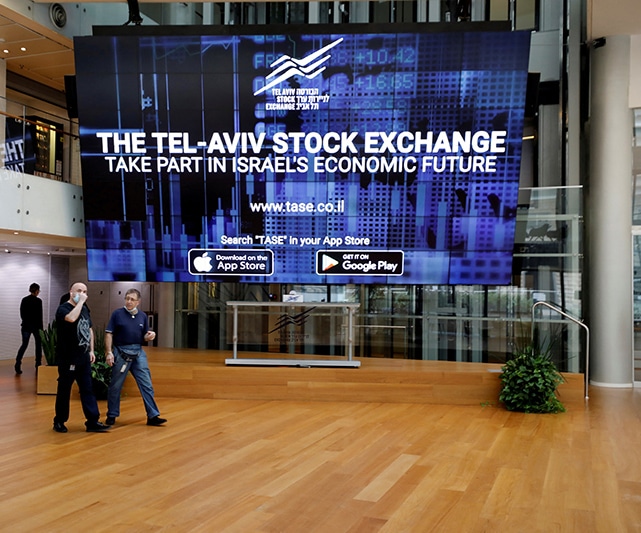The Tel Aviv Stock Exchange said on Tuesday, Dec. 5, that a report by U.S. researchers suggesting there were investors in Israel who may have profited from prior knowledge of Hamas’ Oct. 7 attack was inaccurate and its publication irresponsible.
Research by law professors Robert Jackson Jr. from New York University and Joshua Mitts of Columbia University found significant short-selling of shares in the MSCI Israel ETF leading up to the attacks, which triggered Israel’s ongoing war with Hamas.
The activity, they said, “exceeded the short-selling that occurred during numerous other periods of crisis” such as the 2008 financial crisis and COVID-19.
They wrote that for Leumi, Israel’s largest bank, 4.43 million shares sold short over the period Sept. 14 to Oct. 5 yielded profits of 3.2 billion shekels ($859 million).
But the Tel Aviv Stock Exchange (TASE) said the authors miscalculated, since share prices are listed in agorot, which are similar to cents and pence, rather than shekels —she putting the potential short sale profit at just 32 million shekels. ($1 = 3.7243 shekels)
Yaniv Pagot, head of trading at the exchange, said that in looking at short interest in Leumi, there was an increase of some 4.5 million shares in the week ending Sept. 21 and it then remained stable.
“I don’t see in the data something even close to what they wrote in the paper,” Pagot told Reuters, adding the researchers didn’t speak to the TASE or members. “There was nothing unusual in short positions in the stock exchange in the two months before the attack.”
Mitts told Reuters via email that the 67-page report had now been corrected, but that the currency issue did not affect the “highly unusual” exchange-traded fund (ETF) and short-dated options activity also identified by the researchers.
Their report said “short interest in the MSCI Israel Exchange Traded Fund (ETF) suddenly, and significantly, spiked” on Oct. 2, based on data from the Financial Industry Regulatory Authority (FINRA).
Pagot said he did not understand “the theory about the ETFs.”
He also said the short position in Leumi was taken by an unidentified Israeli bank known to the TASE.
“We know their compliance is very strict so it’s unlikely that such a position that came from a terror organization can pass through this member’s compliance for money laundering or something like that,” he said, referring to media speculation that Hamas itself was behind the short selling.
Israel’s securities regulator said it had been aware of the report for a week and was in contact with the researchers, but declined to comment while it investigates the TASE’s rebuttal.
This article was provided by Reuters.







